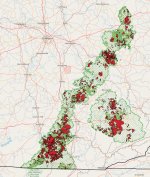franklin
Gold Member
- Jun 1, 2012
- 5,016
- 7,151
- Detector(s) used
- Garrett ADS-7X, Fisher Two Box M-Scope, Mother Lode Locator, Dowsing Model 20 Electroscope, White's TM808, White's TM900, Inground Scanners
- Primary Interest:
- All Treasure Hunting
Not all federal property. There's ample federal locations where md'ing is not forbidden. BLM and NFS (unless some specific location has an exception ). And sure, .... Arpa would kick in. Just don't find stuff over 50 yrs. old. But this is different than the age old oft-repeated mistaken notion that "all federal land is off-limits".
It is never all properties but it is best to know where and what you can or can not do as this I found on the Internet:
https://screenshots.firefox.com/Gobc8YTlLtpA6RZw/www.nps.gov







